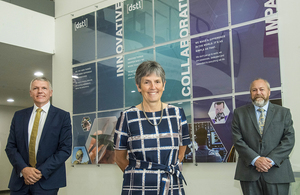- Measures will allow UK-wide rollout of vaccine to save lives and bring pandemic to an end
- Proposals to bolster safeguards and improve access to protect the public ahead of the winter
- COVID-19 vaccines will only be given to UK patients if proven to be safe and effective
A raft of measures to allow the safe future mass rollout of a COVID-19 vaccine have been outlined by the government today (Friday 28 August).
The new rules and safeguards will strengthen the UK’s ability to successfully deploy a UK-wide vaccination programme, which will be crucial in saving lives and bringing the current pandemic to an end.
The measures include:
- reinforced safeguards to support the Medicines and Healthcare products Regulatory Agency (MHRA) to grant temporary authorisation for the use of a new COVID-19 vaccine ‒ provided it meets the highest safety and quality standards
- expanding the trained workforce who can administer COVID-19 and flu vaccines to improve access and protect the public
- clarifying the scope of the protection from civil liability for the additional workforce that could be allowed to administer vaccinations
If a vaccine is discovered before 2021, the proposals will bolster existing powers that allow the MHRA to consider approving its use, before a full product licence is granted, provided it is proven to be safe and effective during robust and extensive clinical trials.
The measures are necessary because during the transition period, a new potential COVID-19 vaccine must be granted a licence by the European Medicines Agency (EMA).
The regulations will permit the MHRA to consider giving temporary authorisation allowing patients to benefit while it undergoes the full licensing process, with reinforced conditions attached to ensure safety, quality and efficacy.
This is a precautionary measure and will be used as a last resort if there is a strong public health justification for widespread use of a vaccine before it has been granted a product licence.
From 2021, MHRA will have a national licensing system in place and will be responsible for granting licences for potential COVID-19 vaccines and treatments once they meet high standards of safety and effectiveness.
Deputy Chief Medical Officer, Professor Jonathan Van-Tam, said:
We are making progress in developing COVID-19 vaccines which we hope will be important in saving lives, protecting healthcare workers and returning to normal in future.
If we develop effective vaccines, it’s important we make them available to patients as quickly as possible but only once strict safety standards have been met.
The proposals consulted on today suggest ways to improve access and ensure as many people are protected from COVID-19 and flu as possible without sacrificing the absolute need to ensure that any vaccine used is both safe and effective.
The MHRA has the power to grant an unlicensed medicine or a vaccine temporary authorisation where a product is proven to be safe and effective and is in the best interest of the patient on the basis of available evidence.
A consultation is being launched today, which will look to amend the Human Medicine Regulations 2012 and will last 3 weeks, seeking the opinions and advice on the proposals from health experts and key stakeholder groups.
The measures could come into force by October, ahead of the winter season.
Dr Christian Schneider, Director of National Institute for Biological Standards and Control (NIBSC) ‒ part of the MHRA ‒ said:
Protecting health and saving lives is at the heart of all our work. Throughout the pandemic, the MHRA has prioritised work to ensure rapid approval of robust clinical trials to test a range of medicines and vaccines, whilst maintaining the highest quality and safety standards.
Whilst the existing licensing system, or a new UK one from next year, is the preferred and expected route to supply any vaccine, these new measures will strengthen the regulatory regime and our ability to protect public health.
The proposals will also allow more fully trained healthcare professionals to administer vaccines under NHS and local authority occupational health schemes, as well as enable an expanded workforce that can administer vaccinations to the public. This will make it easier and quicker for patients to access the vaccines they need, protecting them against potentially serious and fatal diseases.
The expanded workforce will undergo a robust training programme, and could include a wider range of existing NHS staff, as well as groups such as student doctors and nurses.
The consultation will also look at clarifying the scope of the protection from civil liability, which the regulations already give to healthcare workers and manufacturers, to ensure it applies to the companies which order the medicines and the additional workforce that could be allowed to administer vaccinations.
This will establish a fairer and more equal footing and encourage companies to place cutting-edge medicines on the markets as soon as possible, ensuring UK patients can be the first to benefit.
Find the full consultation here.


